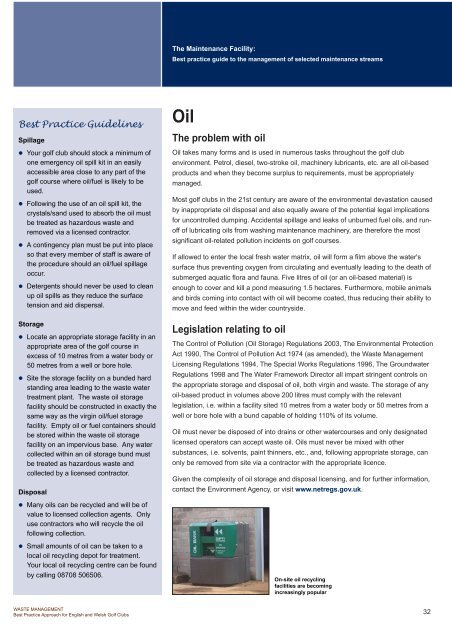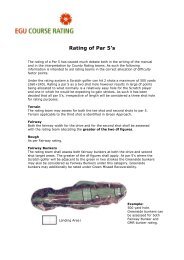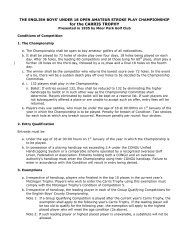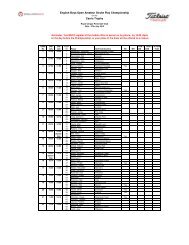Waste management - England Golf
Waste management - England Golf
Waste management - England Golf
You also want an ePaper? Increase the reach of your titles
YUMPU automatically turns print PDFs into web optimized ePapers that Google loves.
The Maintenance Facility:<br />
Best practice guide to the <strong>management</strong> of selected maintenance streams<br />
Best Practice Guidelines<br />
Spillage<br />
Your golf club should stock a minimum of<br />
one emergency oil spill kit in an easily<br />
accessible area close to any part of the<br />
golf course where oil/fuel is likely to be<br />
used.<br />
Following the use of an oil spill kit, the<br />
crystals/sand used to absorb the oil must<br />
be treated as hazardous waste and<br />
removed via a licensed contractor.<br />
A contingency plan must be put into place<br />
so that every member of staff is aware of<br />
the procedure should an oil/fuel spillage<br />
occur.<br />
Detergents should never be used to clean<br />
up oil spills as they reduce the surface<br />
tension and aid dispersal.<br />
Storage<br />
Locate an appropriate storage facility in an<br />
appropriate area of the golf course in<br />
excess of 10 metres from a water body or<br />
50 metres from a well or bore hole.<br />
Site the storage facility on a bunded hard<br />
standing area leading to the waste water<br />
treatment plant. The waste oil storage<br />
facility should be constructed in exactly the<br />
same way as the virgin oil/fuel storage<br />
facility. Empty oil or fuel containers should<br />
be stored within the waste oil storage<br />
facility on an impervious base. Any water<br />
collected within an oil storage bund must<br />
be treated as hazardous waste and<br />
collected by a licensed contractor.<br />
Disposal<br />
Oil<br />
The problem with oil<br />
Oil takes many forms and is used in numerous tasks throughout the golf club<br />
environment. Petrol, diesel, two-stroke oil, machinery lubricants, etc. are all oil-based<br />
products and when they become surplus to requirements, must be appropriately<br />
managed.<br />
Most golf clubs in the 21st century are aware of the environmental devastation caused<br />
by inappropriate oil disposal and also equally aware of the potential legal implications<br />
for uncontrolled dumping. Accidental spillage and leaks of unburned fuel oils, and runoff<br />
of lubricating oils from washing maintenance machinery, are therefore the most<br />
significant oil-related pollution incidents on golf courses.<br />
If allowed to enter the local fresh water matrix, oil will form a film above the water's<br />
surface thus preventing oxygen from circulating and eventually leading to the death of<br />
submerged aquatic flora and fauna. Five litres of oil (or an oil-based material) is<br />
enough to cover and kill a pond measuring 1.5 hectares. Furthermore, mobile animals<br />
and birds coming into contact with oil will become coated, thus reducing their ability to<br />
move and feed within the wider countryside.<br />
Legislation relating to oil<br />
The Control of Pollution (Oil Storage) Regulations 2003, The Environmental Protection<br />
Act 1990, The Control of Pollution Act 1974 (as amended), the <strong>Waste</strong> Management<br />
Licensing Regulations 1994, The Special Works Regulations 1996, The Groundwater<br />
Regulations 1998 and The Water Framework Director all impart stringent controls on<br />
the appropriate storage and disposal of oil, both virgin and waste. The storage of any<br />
oil-based product in volumes above 200 litres must comply with the relevant<br />
legislation, i.e. within a facility sited 10 metres from a water body or 50 metres from a<br />
well or bore hole with a bund capable of holding 110% of its volume.<br />
Oil must never be disposed of into drains or other watercourses and only designated<br />
licensed operators can accept waste oil. Oils must never be mixed with other<br />
substances, i.e. solvents, paint thinners, etc., and, following appropriate storage, can<br />
only be removed from site via a contractor with the appropriate licence.<br />
Given the complexity of oil storage and disposal licensing, and for further information,<br />
contact the Environment Agency, or visit www.netregs.gov.uk.<br />
Many oils can be recycled and will be of<br />
value to licensed collection agents. Only<br />
use contractors who will recycle the oil<br />
following collection.<br />
Small amounts of oil can be taken to a<br />
local oil recycling depot for treatment.<br />
Your local oil recycling centre can be found<br />
by calling 08708 506506.<br />
On-site oil recycling<br />
facilities are becoming<br />
increasingly popular<br />
WASTE MANAGEMENT<br />
Best Practice Approach for English and Welsh <strong>Golf</strong> Clubs<br />
32

















